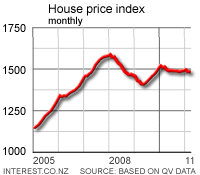ANZ National economists said in their latest 'Market Focus' that New Zealand did not face a housing shortage at the national level despite the developing situation of excess housing demand. The economists argued there had been "sufficient excess supply in the past few years to absorb the rise in housing demand in the short-term." However, they did argue that in some regional cases, such as in Auckland, the situation was different from the overall national experience, with a persistent excess demand situation (in Auckland) over the past few years.  Many commentators and real estate watchers have been pointing to an apparent shortage of housing stock - as net migration rises and building consents fall - as a factor to why house prices will not fall further from current levels. Prices rose significantly between 2003 and 2007. Since then the latest QV index figures show house prices are down 10.7% from their peak in January 2008. The ANZ economists pointed out that the recent collapse in the number of building consents issued, along with the rise in net migration, meant that an excess demand situation for housing had developed. "On the face of it, this would point to upward pressure on house prices."
Many commentators and real estate watchers have been pointing to an apparent shortage of housing stock - as net migration rises and building consents fall - as a factor to why house prices will not fall further from current levels. Prices rose significantly between 2003 and 2007. Since then the latest QV index figures show house prices are down 10.7% from their peak in January 2008. The ANZ economists pointed out that the recent collapse in the number of building consents issued, along with the rise in net migration, meant that an excess demand situation for housing had developed. "On the face of it, this would point to upward pressure on house prices."
Indeed, there have been anecdotes of late that new listings have been getting scarcer. The rebound in the number of house sales has resulted in a lower market "inventory" from the equivalent of over 12 month's sales at the end of last year to under 8 months currently (still higher than inventory of 5 month's equivalent sales prior to the housing market correction). So are we really heading for a housing shortage crisis? To answer this question, it is important to distinguish between the flow and the stock. Based on recent flows (i.e. new demand from population growth versus new houses being constructed), there is no doubt that excess demand exists, as described earlier. But we need to take into account the fact that this comes after several years of excess supply.Data since 1991 shows that the last time there was excess demand was in 2002 and 2003. This was brought about by a surge in net migration. But since 2004, there has been excess supply as migration eased while consent issuance remained higher for most of that period. Indeed, when we add up the cumulative demand-supply situation since 1991, there has been an excess supply of around 37,000 dwellings. There is some uncertainty in regards to key assumptions such as average people per house and depreciation. But tweaking these does not change the broad story. There is a housing "buffer" that can be used to absorb any temporary excess demand. This is also evident when we look at the total number of households currently versus the total number of dwellings in the country (the housing stock), which suggests there is still enough vacant houses to satisfy several year's worth of new demand. The last comprehensive snapshot was the 2006 Census, which recorded 110,000 dwellings that were empty (6.7 percent of total dwellings) and a further 13,500 that were under construction. Of course, we know that some of those houses are vacant for a reason (holiday homes, etc). But nonetheless, they can be occupied if need be.
However, ANZ's economists said there had been excess housing demand in Auckland for a number of years.
Even assuming no depreciation of the existing housing stock in Auckland, the number of consent issuance has fallen short of household growth. Given that Auckland is likely to be the main beneficiary of the net migration inflows, the excess demand situation is likely to intensify over the coming year. This will lead to upward pressure on rents and house prices in the region, if housing supply does not start to respond soon. However, other parts of the country which does not face any excess demand will continue to face downward pressure on house prices. Particularly those in the popular holiday home hotspots.

We welcome your comments below. If you are not already registered, please register to comment
Remember we welcome robust, respectful and insightful debate. We don't welcome abusive or defamatory comments and will de-register those repeatedly making such comments. Our current comment policy is here.